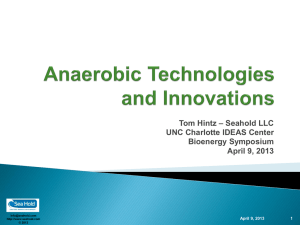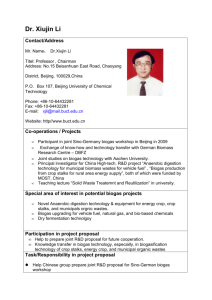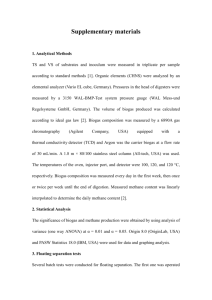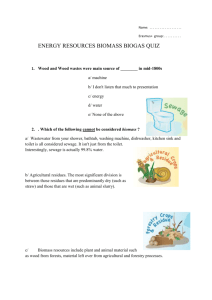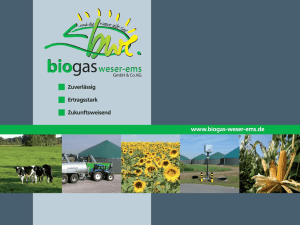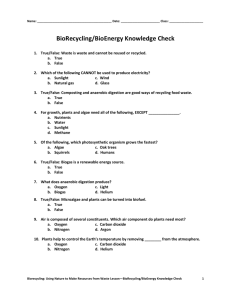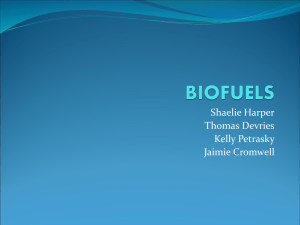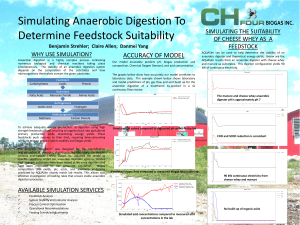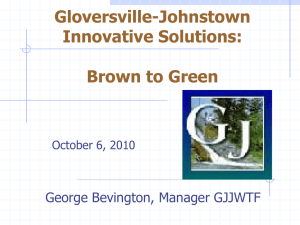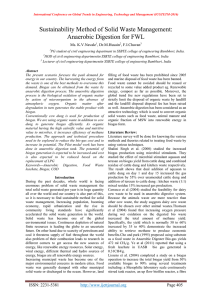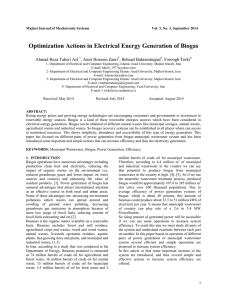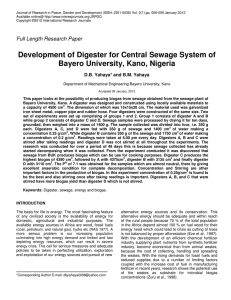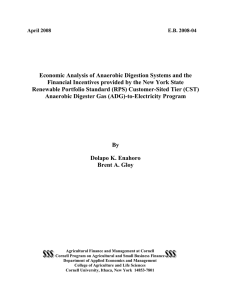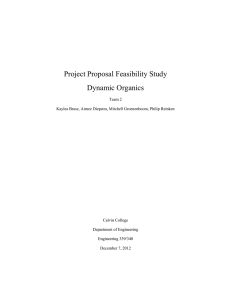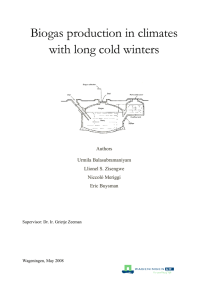Discussion Forum: Biogas
advertisement
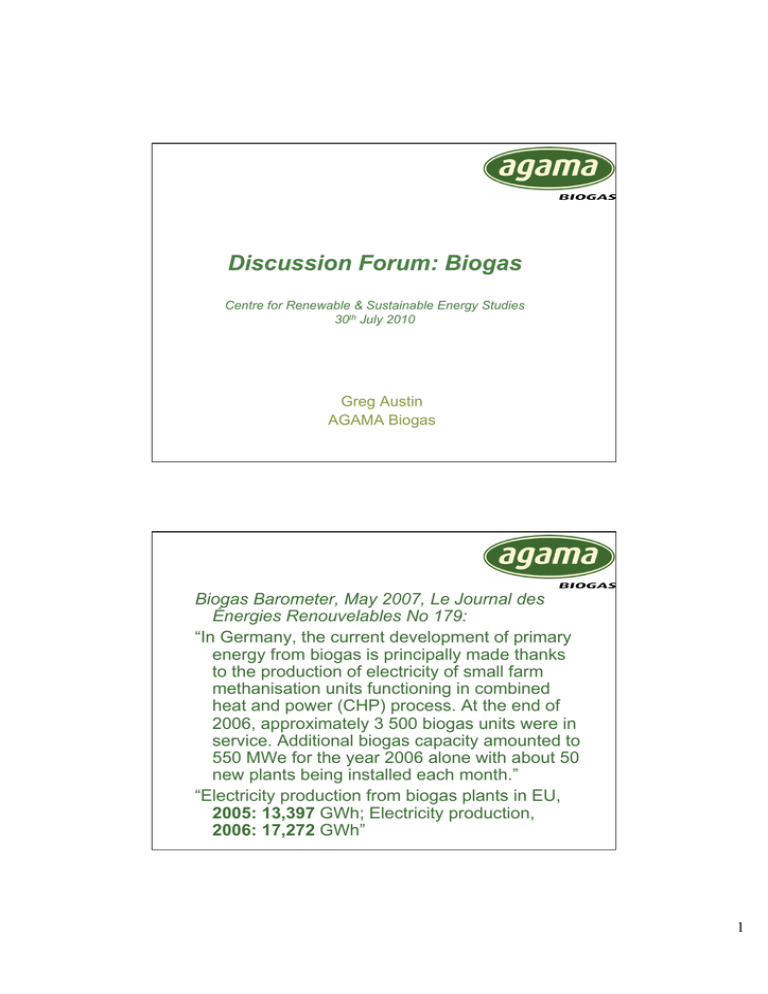
Discussion Forum: Biogas Centre for Renewable & Sustainable Energy Studies 30th July 2010 Greg Austin AGAMA Biogas Biogas Barometer, May 2007, Le Journal des Énergies Renouvelables No 179: “In Germany, the current development of primary energy from biogas is principally made thanks to the production of electricity of small farm methanisation units functioning in combined heat and power (CHP) process. At the end of 2006, approximately 3 500 biogas units were in service. Additional biogas capacity amounted to 550 MWe for the year 2006 alone with about 50 new plants being installed each month.” “Electricity production from biogas plants in EU, 2005: 13,397 GWh; Electricity production, 2006: 17,272 GWh” 1 Overview •! Introduction to biogas •! Context: why anaerobic digestion? •! Technology discussion •! Implementation •! Barriers & opportunities •! Case studies •! Viability •! Challenges What is biogas? •! •! •! •! Biogas is a clean, renewable, naturally produced source of energy It is produced through an anaerobic biological process of conversion utilising any organic material (e.g. animal manure, food waste, green waste). This process breaks down the organic material and generates methane (CH4), similar to natural gas, which can be used for heating, cooling, electricity production, motorised vehicle fuel, etc. Carbon dioxide (CO2) is also part of the biogas produced The biogas can be piped, bottled, stored, compressed, and even liquefied (as biomethane) Water & Waste Digester Waste slurry from digester after anaerobic process Slurry used as fertilizer Methane Rich Biogas Generator producing electricity for site (critical loads), cooking fuel, heat, light 2 Gas yields How does it work? •! Bugs! •! Anaerobic digestion is the natural decomposition of organic matter in an anaerobic environment (oxygen free) •! The process requires at least two steps !! Acidogenesis •! organics converted to acetate and H2 !! Methanogenesis •! Acetate and H2 converted to methane •! These steps rely on a diverse and interdependent group of bacteria to complete the process 3 Why Why and biogas where? •! •! Waste management !! !! !! !! Landfill space Treatment capacity Carbon emissions Odours & flies Energy supply !! !! !! !! Renewable energy Electricity crisis Price hikes Housing development uncertain •! Water supply •! Fertiliser supply !! Crisis looming Integrated Solution 4 Opportunities Commercial & Domestic Agriculture •! on-site energy, waste management, nutrients •! sewage/food waste/grass •! scale: kg LPGe/day •! NEMA •! energy security •! nutrient recycling •! REFiT? Carbon finance?? •! Manures/residues/silage •! kW – MW // tons LPGe/day Anaerobic digestion Food & Beverage •! on-site energy & waste management •! cost savings •! REFiT? Carbon finance?? •! kW – MW // tons LPGe/day MSW & Sewage sludge •! Waste Act •! Upstream vs. end-of-pipe •! sewage/food waste/grass/etc •! REFiT? Carbon finance?? •! MW // ktons LPGe/day Digester technology: •! Depends on … !!Feedstocks (type and amount) !!Feedstock total solids (TS) concentration •! With livestock the key technology factor is the TS –! Flushed barns have TS < ~5% –! Scraped barns have TS > ~5% !!Facility location !!Management structure !!Other factors e.g. bedding materials 5 CSTR (Complete Stirred Tank Reactor) Plug-Flow Digester 6 Covered Lagoon Schematic layout (farm) 7 Planning a system •! Optimise the location of the digester for gravity flow, proximity to !! gas use, !! nutrient use, !! Existing waste management structures •! Optimise the outputs of the system by !! Finding thermal applications for the gas !! Finding heat applications if generating electricity •! Utilise the nutrients in the digestate, both solid and liquid Information needed •! How many animals? Size? Feed amounts? •! How much waste is generated? •! Volume of water used? •! Other components of waste e.g. bedding? •! Flushing system? •! Current energy usage and cost? •! Any other economic considerations? 8 Hydraulic dome BiogasPro •! The BiogasPro is a commercially available product designed for digesting a range of different feedstocks, and maximising the amount of thermal energy and organic fertilisers generated on-site. •! Pre-fabricated digester, installed in 2 days 9 BiogasPro contd. •! Roto-moulded LDPE (like a rainwater tank) •! 2.2 m diameter, 2.4 m height •! Maximum loading with 25 kg/day will produce ~2kg of LPG-equivalent per day •! Can be connected batch-mode to biodegrade larger volumes BiogasPro 10 Case Study – Cato Manor •! Type !! Hydraulic fixed slab digester with aquaculture !! 280 m3 digester !! R1.2 mil (max 4 y breakeven) Cato Manor (cont) •! Feedstock !! Sewage (70 m3), OFMSW & Chicken litter (~3t/day max) 11 Cato Manor (cont) •! Yield !! Min:13 t/a LPGe !! Max: 67 t/a LPGe •! Output cost •! (amortise in 1 year) !! Min: R92k/t/a LPGe !! Max: R18k/t/a LPGe •! Low maintenance Household Viability •! Pre-fabricated digester •! National Biogas programme •! Enhance quality of life: !! Waste management !! Sanitation !! Reduce drudgery !! Clean cooking 12 Municipal Viability •! •! OFMSW and WWTW A more integrated approach to on-site waste and water management will provide: !! !! !! !! Improved sustainability Lower and more stable operating costs Reduced resource consumption and emissions Improved water security •! Flexible and resistant to increasing financial and environmental pressures •! http://www.sacities.net/members/new_publication.stm Agricultural Viability •! •! •! •! •! •! •! Viability in general improves with !! Higher TS in the waste !! Larger number of animals !! Combining different animal units Carbon finance is extremely important REFiT will affect viability to a great degree Fertiliser use has the largest impact on the economics of the system Leasing electricity generation equipment can improve the economics (though costs need still to be confirmed) Utilising waste heat improves the economics Literature confirms that odour reduction of ~90% is achieved Source: Premier Pork Producers Farm Feasibility Studies, AGAMA Biogas (2008) 13 Barriers and Opportunities •! Rural Household !! Capital costs !! National programme (DoE, W for E) •! Municipal / Industrial !! Overcoming regulatory hurdles (DWAE) !! Integrated infrastructure (Munic, Devel) •! Agriculture / F&B !! Insufficient incentive (but green / organic) !! Methane to energy carbon projects (but high transaction costs) Practical challenges •! Carbon finance still doubtful (transaction costs – size dependant) •! Uncertainty in market relating to REFiT, RECs •! Much emphasis on liquid biofuels … •! Co-ordination of relevant government sectors needed !! Working for Energy programme a catalyst to address this? 14 Thanks for your attention! Greg Austin greg.austin@agama.co.za www.agama.co.za www.biogaspro.com 021 701 3364 15
